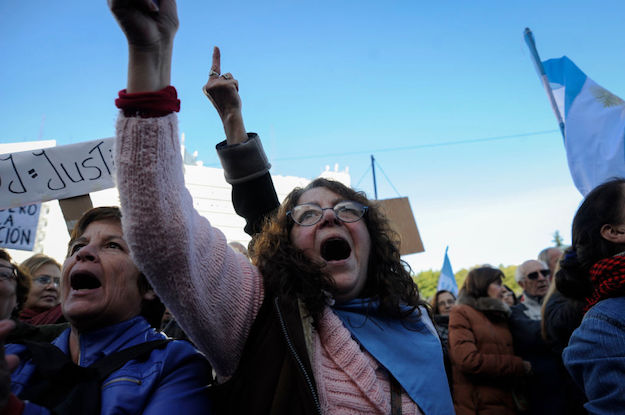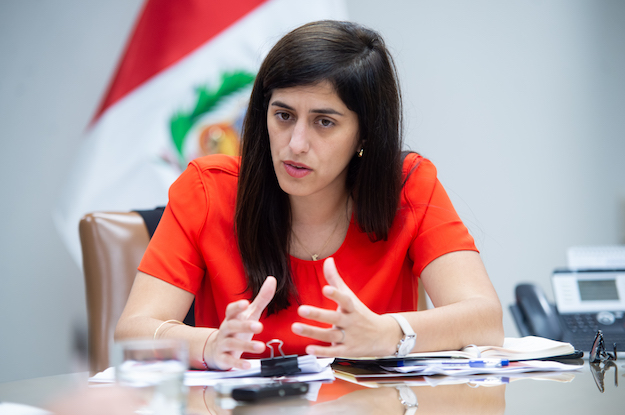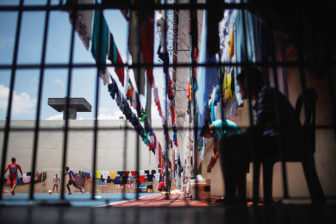BUENOS AIRES – The Odebrecht scandal has ricocheted around Latin America like a corruption cluster bomb. So far, the Brazilian construction behemoth has admitted to bribing ten governments in the region, including Argentina, Brazil and Mexico. In Peru, Pedro Pablo Kuczynski’s links to Odebrecht led to his resignation as president last month. (Earlier, his predecessor, Ollanta Humala, was detained for accepting Odebrecht bribes.) In Ecuador, a court sentenced the vice president, Jorge Glas, to six years in prison for taking Odebrecht bribes. Not to mention Brazil, where on Saturday former President Luiz Inácio Lula da Silva, the front-runner in October’s presidential election, began serving a 12-year prison sentence for public corruption.
So far, however, Brazil’s contagious corruption scandal has largely passed over neighboring Argentina. That is unusual, and not only because of proximity. Argentina suffers from infamously high levels of corruption, not least during the 12-year reign of former Presidents Néstor Kirchner and Cristina Fernández de Kirchner, from 2003 to 2015. Since Fernández de Kirchner left office two years ago, she and her entourage have been dogged by corruption investigations. Police have detained her former vice president; a favorite government contractor; and a former public works minister, who was caught tossing a bag of cash over a monastery wall. Fernández de Kirchner, now a senator, faces a litany of criminal charges herself. She denies all the allegations, but an influential columnist, Carlos M. Reymundo Roberts, recently predicted she would be spending “more time in court than on the campaign trail” in the coming years.
The U.S. Department of Justice says Odebrecht paid out at least $35 million in bribes in Argentina from 2007 to 2014, “with the understanding that these payments would be passed, in part, to government officials” to grease the wheels for infrastructure projects. (According to the Argentine daily La Nación, those projects included a natural gas pipeline, a water treatment plant and a refinery for the state oil company, YPF.) Yet so far, Argentina has largely remained an Odebrecht-free zone.
The explanation is not altogether clear, leaving some observers to fear that judges, prosecutors, lawmakers and even anticorruption crusaders in President Mauricio Macri’s government might be dragging their feet to protect political allies. That is unlikely, as Odebrecht malfeasance seems more likely to stain Kirchner-era officials. Others suspect Macri, aided by the country’s notoriously pliant judges, has opted to keep his predecessor out of prison, which has left the opposition divided between Fernández de Kirchner’s acolytes and moderate Peronists. Either way, Argentina’s apparent Odebrecht immunity has left the uneasy sensation that there is another shoe to drop.
Based on conversations with contacts in and out of government during our recent visit to Buenos Aires, the delays in Argentina’s investigations seemingly originate in the attorney general’s office. Until recently, Argentina’s top prosecutor, Alejandra Gils Carbó, was a Fernández de Kirchner holdover who for months refused Macri’s pleas to resign. Many observers considered Gils Carbó to be highly partisan, an apologist for corrupt former officials and utterly oblivious to Odebrecht. Last June, Macri’s justice minister, Germán Garavano, lashed out at the attorney general, saying her investigation into Odebrecht was “being delayed in a shameful way.” In December, she finally stepped down. But Macri did not nominate a permanent replacement until last month. The nominee, Judge Inés Weinberg de Roca, of the Buenos Aires City’s Superior Tribunal of Justice, still needs Senate approval.
In the meantime, Argentine investigators have also been hamstrung by their struggles to cooperate with foreign counterparts, including in the United States. Argentine law is partly to blame, complicating efforts to share and receive information. In June, after meeting with U.S. Attorney General Jeff Sessions, Argentina’s justice minister said he hoped to sign an information-sharing agreement with the United States, but acknowledged it would “not be easy.” International cooperation has also been complicated by mistrust, including fears of leaks by Argentina’s criminal justice institutions.
At Macri’s urging, Argentine lawmakers in 2016 approved legislation permitting plea bargains for the first time in corruption cases. The ley del arrepentido was designed to supercharge corruption investigations by providing whistleblowers and criminal collaborators incentives, such as reduced sentences, to help take down high-level lawbreakers. So far, it has been a bust. The law does not grant investigators the broad powers available to prosecutors in the United States or Brazil, where plea deals have buoyed the Lava Jato investigation. For example, in Argentina, a plea agreement cannot keep a suspect out of prison, and even a sentence reduction is limited to half the standard time behind bars. Moreover, reduced sentences are only available for information implicating suspects at an equal or higher level to the cooperating witness, and then only if a judge determines the information was helpful. Given the glacial pace of trials in Argentina and the culture of impunity, suspects have so far opted not to cooperate.
The Odebrecht investigation in Argentina has not been completely dormant. Last April, Macri’s presidential campaign admitted receiving a $500,000 contribution from an Odebrecht subsidiary, though the company said the payment was legal. Last November, a federal prosecutor froze $2.7 million belonging to Macri’s cousin, Ángelo Calcaterra, as part of an investigation into his role as the head of the construction firm IECSA, which partnered with Odebrecht on a Sarmiento railway project. Last month, Brazilian authorities accused Macri’s intelligence chief, Gustavo Arribas, of accepting $850,000 as part of an alleged money laundering scheme. On April 3, Fernández de Kirchner’s former planning minister, Julio De Vido, was charged with improprieties related to Odebrecht’s contracts to build natural gas pipelines in Argentina. All of these individuals deny wrongdoing, and none has been convicted of the charges.
Still, the Odebrecht slow boil in Argentina is unhelpful to Macri, who has labored mightily to restore Argentina’s international reputation and establish an effective and independent judiciary to reassure foreign investors. That effort received a boost in the latest corruption index from Transparency International, with Argentina outperforming Brazil for the first time in decades. Perhaps Odebrecht will leave Argentina relatively unscathed, or merely add to the rap sheet of Kirchner-era rogues. But given the shortcomings of the nation’s investigatory framework, it is hard to predict how Argentina’s Odebrecht drama will play out.
—
Gedan is a former South America director on the National Security Council and a fellow at the Woodrow Wilson International Center for Scholars
Phalen is a research assistant at the Wilson Center







